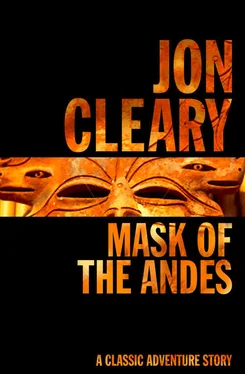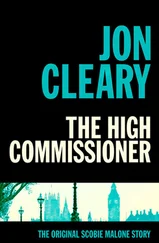Jon Cleary - Mask of the Andes
Здесь есть возможность читать онлайн «Jon Cleary - Mask of the Andes» — ознакомительный отрывок электронной книги совершенно бесплатно, а после прочтения отрывка купить полную версию. В некоторых случаях можно слушать аудио, скачать через торрент в формате fb2 и присутствует краткое содержание. Жанр: unrecognised, на английском языке. Описание произведения, (предисловие) а так же отзывы посетителей доступны на портале библиотеки ЛибКат.
- Название:Mask of the Andes
- Автор:
- Жанр:
- Год:неизвестен
- ISBN:нет данных
- Рейтинг книги:5 / 5. Голосов: 1
-
Избранное:Добавить в избранное
- Отзывы:
-
Ваша оценка:
- 100
- 1
- 2
- 3
- 4
- 5
Mask of the Andes: краткое содержание, описание и аннотация
Предлагаем к чтению аннотацию, описание, краткое содержание или предисловие (зависит от того, что написал сам автор книги «Mask of the Andes»). Если вы не нашли необходимую информацию о книге — напишите в комментариях, мы постараемся отыскать её.
Mask of the Andes — читать онлайн ознакомительный отрывок
Ниже представлен текст книги, разбитый по страницам. Система сохранения места последней прочитанной страницы, позволяет с удобством читать онлайн бесплатно книгу «Mask of the Andes», без необходимости каждый раз заново искать на чём Вы остановились. Поставьте закладку, и сможете в любой момент перейти на страницу, на которой закончили чтение.
Интервал:
Закладка:
He wandered through the alleys between the stalls, looking at the jumble of goods displayed. Battered pots and pans, brass ornaments that promised luck, bundles of candles, cane quena flutes, tiny guitar-like kirkinchos, sandals cut from old tyres. bowler hats, wood carvings of the Christ, the Virgin and the Sun God, take your pick, faded magazines from which Marilyn Monroe, Elvis Presley and Elizabeth Taylor smiled their empty international smiles: there was something for everyone, if everyone had money. A woman, small bowler hat sitting high on the pumpkin of her head, stopped by a stall and held out a string bag full of potatoes. The stall-owner shook his head, but the woman persisted. The man hesitated, then picked up two candles, gave them to the woman and took the potatoes. The woman went away, heading for the small church that stood on the other side of the plaza at the far end of the market. The candles would be lit and offered up for God knew what reason. The stall-owner looked at Taber, then held up the bag of potatoes. Taber smiled, shook his head and moved on. He had as little use for potatoes as he had for votive candles.
He stopped in front of a woman selling coca leaves. She sat huddled under a poncho; a baby hung in a shawl from her back like a growth. She looked up when Taber’s shadow fell across her, then looked away at once: gringos did not buy the coca leaf. A boy of about twelve, barefooted and ragged, crept along the wall of the store outside which the woman sat; he stopped by her, then held out a grimy hand in which lay some coins. The woman looked at him, then scooped some of the pale green leaves into a horn of paper, dropped some grey lime into another horn and handed them to him. The boy at once dropped down on his haunches against the wall, took some of the leaves and began to chew them.
‘What’s he doing?’
Carmel McKenna had stepped out from between two stalls. She was dressed in slacks and a suède jacket and had a pair of sunglasses pushed back on her head like a glass tiara.
‘Watch him.’
The boy took the small wet ball of leaves from his mouth, added some of the powdered lime, then popped the ball back into his mouth. He sat back against the wall, turned his face up to the sun, closed his eyes and began to chew.
‘It’s cocaine, only here they chew it instead of sniffing it. He puts the lime in it as an alkaline, to bring out the taste.’ As they watched, the boy, still with his eyes closed, tilted his head to one side and spat. ‘He’s an expert.’
‘What sort of expert?’
‘The trick is to spit out the saliva without burning your lips from the lime. He’s got it down to a fine art.’
‘But he only looks about ten or twelve!’
‘They start up here at about seven. They don’t do it for kicks. They do it as an escape from the bloody misery of their existence.’
He did not condone the habit of coca chewing, but he was abruptly angry with her. Damned outsiders.… Then he remembered the outsider’s standards he had tried to introduce over at the station. He smiled, his stern bony face suddenly made attractive. ‘I’m sorry.’
‘Why?’
‘I was angry with you.’
‘I wouldn’t have known. You look pretty sour all the time. You’d have a ghastly temper, wouldn’t you?’ He had noticed that she had all the adjectives they seemed to teach at expensive schools: ghastly was a class badge. But even as he thought it he smiled inwardly at himself: he still had a county grammar school mentality. They began to walk slowly up between the stalls, the Indians watching them with wary curiosity. ‘Why were you angry with me?’
‘I don’t know,’ he lied.
‘You’re a very difficult man, Mr Taber,’ she said, then let him off her hook. ‘Tell me more about why young kids like that boy take to cocaine so young.’
‘Well, for one thing, by chewing it they can go for days without food. That boy probably doesn’t know what a square meal looks like.’
‘He had enough money to pay for the leaves and the lime.’
‘A few cents. That’ll keep him going for two or three days. If he’d bought food with it, he’d have got enough for two or three mouthfuls.’
‘Do they become addicted to the drug?’
‘What do you think?’ he said, his voice irritable again. Christ, these outsiders lived in a cocoon; and this time he did not include himself with her as an outsider. ‘Look.’
A youth of about twenty lay sprawled against a wall. Taber took Carmel’s arm and moved her closer. The Indian’s mouth gaped open, exposing green stumps of teeth against whitish gums.
Black stains ran down from the corners of his mouth where the saliva had dribbled. His skin was yellow and there were deep purple rings round his eyes. Though he was unconscious, indeed looked dead, his pale lips occasionally quivered, like a silent appeal for help.
‘He’s a goner,’ said Taber. ‘He’ll be dead in twelve months at the outside.’
‘You don’t sound very upset,’ said Carmel, turning away, feeling suddenly cold: it was as if for the first time she had seen the skull of a living man, smelt the turned earth of his waiting grave.
‘I’ve spent twelve years among people who die every day from malnutrition. I’m still upset by it, but I have to keep it to myself. That chap won’t die from drug addiction, that’ll only be the means. He’ll die because he’s never had enough to eat, because he was born to a miserable bloody existence that no human being, in today’s world, should have to endure!’
‘You’re angry again,’ she said. ‘But this time I understand.’
‘I should hope to Christ you would,’ he said and did not apologize. ‘If you don’t, after seeing that, there’s no bloody hope for him and his people. Or for you.’
They had come out of the market into a plaza. They walked beneath a colonnade above which hung farolas, the closed-in, carved wooden balconies from old Spain. Hidalgos of past centuries had walked here, secure in their own present, careless of the future; now their descendants, old men in stiff white collars and stiff black suits, walked with the same dignity but not the same confidence. The stores along the colonnade that once had only wooden shutters now had plate-glass windows; none of the stores had any customers, as if all stocks had been sold and the store-owners had not thought it worth while reordering. Then Taber and Carmel passed a café crowded with criollo boys and girls of high school age; the place bulged with the high spirits that passed for optimism. Above the door was a carved profile of St Sebastian, chipped and smoothed by age: the patron saint of the town looked worn and dejected. Beneath the carving was an enamel sign advertising a soft drink.
‘Inca Cola?’ Carmel’s eyebrows went up in amusement.
‘The Incas never discovered the wheel, but they used clocks, guano fertilizer, they built aqueducts and bridges, they knew all about agricultural terracing and they knew how to make metal alloys. Why shouldn’t they have invented Coca-Cola?’
‘You’re putting me on. Inca Cola.’ She shook her head and they walked on. ‘I’ll bet there’s some American influence there.’ He said nothing, and she looked up at him. ‘Are you anti-American, Mr Taber?’
‘I’m not anti-anyone till people make fools of themselves.’
‘Have we made fools of ourselves down here?’
‘Sometimes. You still have to make your biggest mistake.’
‘What’s that?’
‘Turning your back on South America because it won’t develop the way Washington thinks it should. Anti-Communist, capitalistic and with preference for only American investment.’
‘Do you think we will turn our back on it?’
‘I hope not. There are some people in Washington who are at last beginning to realize that nationalism and Communism are not the same thing. There are a lot of nationalists on this continent, in this country, who have no more love for Communism than they have for your country. But unless they sing God Bless America and let American investment come in here with no strings attached, Washington wants nothing to do with them.’
Читать дальшеИнтервал:
Закладка:
Похожие книги на «Mask of the Andes»
Представляем Вашему вниманию похожие книги на «Mask of the Andes» списком для выбора. Мы отобрали схожую по названию и смыслу литературу в надежде предоставить читателям больше вариантов отыскать новые, интересные, ещё непрочитанные произведения.
Обсуждение, отзывы о книге «Mask of the Andes» и просто собственные мнения читателей. Оставьте ваши комментарии, напишите, что Вы думаете о произведении, его смысле или главных героях. Укажите что конкретно понравилось, а что нет, и почему Вы так считаете.












